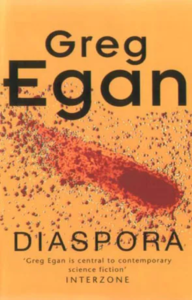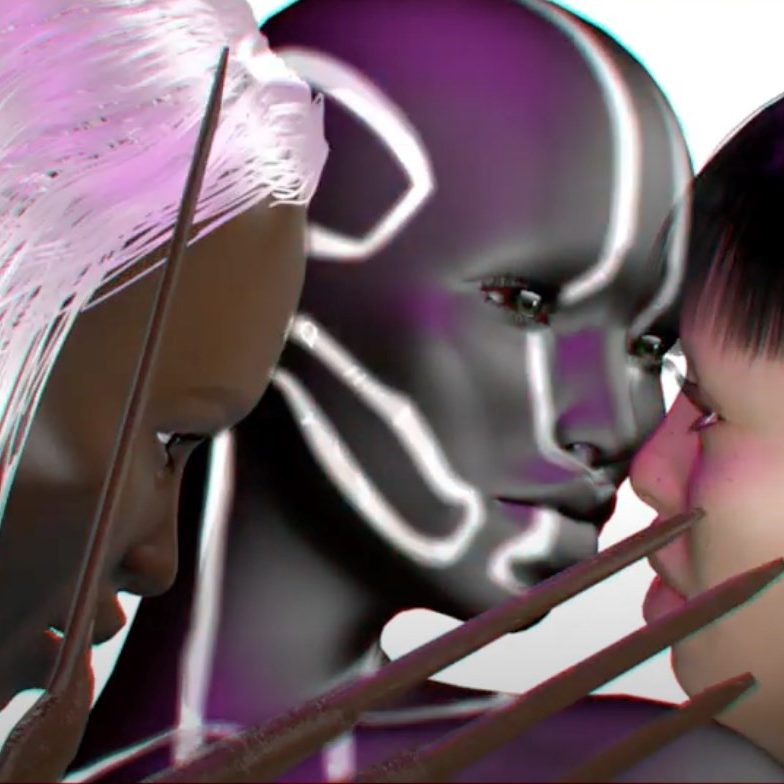 Overview: This is a 2-week novel study designed to analyze Diaspora by Greg Egan. The purpose of the unit is to allow students to gain a greater understanding of the posthuman subgenre of science fiction and to study Egan’s presentation of posthuman identity as it exists in his future universe.The unit will be culminated with a literary analysis paper which links back to other weeks covered in the science fiction study and will allow students to compare and contrast particular themes as they relate to science fiction and the posthuman studies.
Overview: This is a 2-week novel study designed to analyze Diaspora by Greg Egan. The purpose of the unit is to allow students to gain a greater understanding of the posthuman subgenre of science fiction and to study Egan’s presentation of posthuman identity as it exists in his future universe.The unit will be culminated with a literary analysis paper which links back to other weeks covered in the science fiction study and will allow students to compare and contrast particular themes as they relate to science fiction and the posthuman studies.
Schedule – Weeks 5 & 6 (Classes 9-12)
______________________________________________________________________
Class 9 (75 minutes)
| Reading – Part I (p. 1-73) |
| Objective(s) –
● Develop a definition and understanding of “hard” science fiction ● Introduce and understand the posthuman dynamics of the novel. ● Analyze the character development of Yatima the details of life in the Polis
|
| Agenda –
*note: much of the early chapters can be somewhat dense with scientific language and heavy description—make students aware that the novel eases off of that as it moves along and much of it is necessary to explain the growth/development of Yatima’s character.
Themes – Posthumanism, Gender, AI
Discussion Questions – (email these ahead of time with each reading)
● Unpack the significance of the title. ● How does Egan present the development of self-awareness and identity development over the course of the first chapter? ● What are some of the noticeable differences between the citizens of the polis, the gleisners, and the fleshers? ● Explain how the citizens of the polis are able to operate in and around the known universe due to the nature of their existence. Are there specific advantages or disadvantages worth noting after their interaction with the fleshers?
Introduction – 10 minutes
● Preliminary thoughts on the first reading. Discuss the writing style (“hard” science fiction) and take questions on what students found to be the most challenging aspects of the first read. ● Write down relevant questions/challenges from students on the board in order to address such comments during the discussion.
Discussion – 25 minutes
● Present the first discussion question which covers chapter 1 and how Yatima’s growth is described in detail. ● Map out names of characters. There are only a few characters in the entire novel, so a simple table where more details can be added as students progress through the reading should be sufficient. ● How does Yatima gain knowledge and awareness (p, 22-25)?
Break – 5 minutes
Groups – 20 minutes ● Have students work in small groups to identify the main differences between the gleisners and the fleshers. ● If time allows, the same groups can address the third discussion prompt which explains the aspects of how the gleisners are able to operate in and around the known universe as beings who exist essentially as technology.
Discussion – 10 minutes ● Share results from the group work and discuss group findings. ● Explain/fill in any gaps around the details between the gleisner and flesher beings, and the important details that make up gleisner existence.
Questions – 5 minutes ● Leave time for any lingering questions as the first read is the most complex and some students may feel they are still in the dark on what is happening moving into the next section of the novel. |
Class 10 (75 minutes)
| Reading – Parts II-III (p. 75-172) |
| Objective(s) –
● Understanding the conflict presented during this section of the novel. Break down and analyze the character relationships and dynamics between different species. ● Examine the scientific work being done by the citizens of the polis. Explain the desired outcomes of the research being conducted on wormholes. |
| Agenda –
Themes – Future Politics, Science, Mortality Discussion Questions – (email these ahead of time with each reading) ● What do the fleshers value about their existence and why would they refuse to be “downloaded” into the polis? ● Outline the ethics and conflicts facing Yatima and Inoshiro. What challenges do they face when confronted with the crisis in Atlanta and how do they handle the results? ● What sense if any can be made from all of the talk on wormholes and the knowledge of the universe in this section?
TED Talk – 40 minutes ● https://www.youtube.com/watch?v=uAb-mSq615g ● Consider opening with this TED Talk that explains the post-singularity existence which the novel presents. ● Watch and discuss the concepts presented and compare/contrast to those that Egan has developed in the novel.
Break – 5 minutes
Discussion – 25 minutes ● Discuss the assigned reading. Use the discussion questions to facilitate understanding and analysis of the key interactions between main characters. Page 127 provides a key passage for a bigger picture question facing the citizens of the polis and their desire/need to travel the universe. Additional talking points can relate to the discussion questions on pages 140-141.
Wormholes – 5 minutes
● Use a simple visual graphic to help realise the jargon loaded chapter on wormholes in the novel. It is not important to understand the full scientific mechanics here, but to at least be able to visualize what the polis researchers are attempting to do by traveling such great distances across the universe. |
Class 11 (75 minutes)
| Reading – Parts IV-V (p. 173-250) |
| Objective(s) –
● Explore the questions that the novel is asking about understanding the role of life in the universe. ● Analyze the internal conflicts of the different characters as they debate over the nature of what it is to exist in a complex environment that is the universe and their goals of seeking out other advanced life. |
| Agenda –
Themes – Scientific Discovery, Posthuman and Transhuman development, Exploration Discussion Questions – (email these ahead of time with each reading) ● What do the citizens of the Carter-Zimmerman polis aim to discover in their search through the universe and charting of planets? ● What does it mean to inhabit the universe (p. 190)? Think about humanity’s current existence and place in space and time, where are we looking to go and what can be accomplished? Do any of our values align with the future philosophies on display in the novel? ● Revisit how the goals and values of the fleshers differ from the citizens here.
Discussion – 30 minutes ● Close reading of p. 190. Look closely at this conversation and examine the questions being asked. What does it mean to inhabit the universe? Both for everyone in the room, and more so for the characters in the novel? ● Use this time to have students locate other passages which highlight similar thematic points. Character Analysis – 25 minutes ● Discuss the findings made by the C-Z polis researchers on Orpheus. ● What is the purpose and mission of Orlando? Track his character development from Bridger to polis citizen—what is significant about his search for alien life? Utilize the discussion questions here. Orlando is the only character who has existed as both physical being (flesher) and computer lifeform (polis citizen)–challenge students to locate passages where he shows clear links to his past identity and how it impacts him in the present. ● This is a useful link that students may find helpful at this point in the novel as they work toward finishing the reading. ● https://transhumanism.fandom.com/wiki/Diaspora_(novel)
Break – 5 minutes
Paper – 15 minutes ● Introduce the paper assignment. ● This should be taken from the higher-stakes assignment section. A 7-10-page literary analysis paper which highlights a theme explored under the posthumanism umbrella of the novel and compares or contrasts it with another story from a previous section of this unit. Rather than writing on the entire novel, students are asked to highlight one area/example from the novel which represents an element of posthumanism and link that to any of the previous works studied. ● The paper should be argumentative in nature and seek to answer a question from science fiction and posthuman studies that the novel explores. |
Class 12 (75 minutes)
| Reading – Parts VI-VIII (p. 251-321) |
| Objective(s) –
● Analyze the full arch of character development, mainly concerning Yatima and Orlando as the novel concludes. ● Develop a paper topic and question as it relates to the novel. ● Identify at least 3 areas in the novel for textual support and evidence related to the paper topics. |
| Agenda –
Discussion Topics – ● Discuss the ending of the novel. Are readers left with more questions than answers? Does that have anything to do with the nature and genre of the literature? ● Share out examples of topics/areas of interest for writing.
Discussion – 25 minutes ● Spend time with the ending of the novel. Students should be able to lead this discussion. Utilize the first discussion topic bullet if needed to break down what the novel accomplishes or leaves open by the conclusion.
Paper Topics – 15 minutes ● Strategies for developing a paper topic. ● Develop a sample topic and model a search for evidence and useful passages for supporting details.
Break – 5 minutes
Paper Support – 20 minutes ● Shift gears to a discussion of the previous texts covered during this unit. Which stories immediately pair up well with Diaspora? ● Group students either by story selection or by theme. In the groups they should workshop thesis statements, either with a simple 1 minute thesis activity, or collaboratively come up with as many research questions relating to either the shared theme or story selection as they can. ● Optional–in the small groups, students can spend time collaborating on textual support examples as they relate to their chosen themes and research questions. This task will be more suited to the novel aspect of the paper more so than the short story analysis, but it will work for either.
Discussion – 10 minutes ● Time for questions relating to topics, sharing out of ideas from the groups, and any final thoughts relating to the reading of the novel. ● Return to the initial topic and discussion on the posthuman and identity from class 9. Revisit the created definitions from that discussion and see what can be added now that the novel is complete. |
